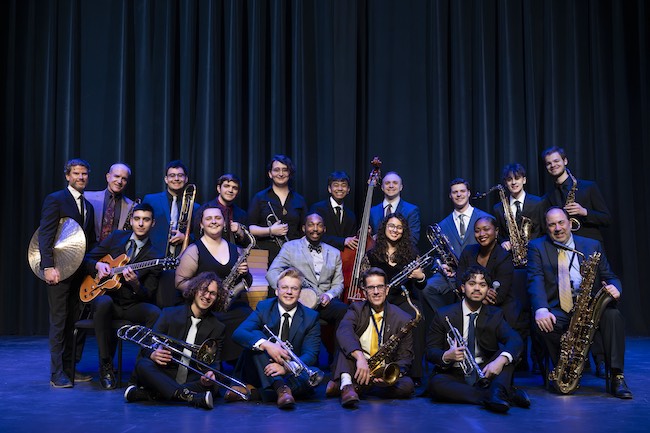Jan 13, 2026 2:09 PM
More Trump-Kennedy Center Cancellations
The fallout from the renaming of the John F. Kennedy Center for the Performing Arts to include President Donald…

George Mason Jazz Ensemble, dreamers all!
(Photo: Joyce Boghosian)Going to college to study music can be a daunting feat. Where should you go? How do you even think about getting in? How can you afford it, considering a musician’s income after graduation? You’ll hear musicians say all the time to skip university training. Just take classes with musicians you admire and start your career four years earlier. That’s much easier said than done.
In asking around, we couldn’t find any prominent current musicians on the scene who took that route, unless they went into the armed services and played in a military band. Those bands, and the discipline taught, probably prove the point — an 18-year-old with a dream needs structure to get them on the road to excellence. So, going to a college or university still offers the best opportunity to have a shot at reaching one’s musical goals.
With that, let’s answer those questions. First, where should you go? It all depends on what each student is looking for — a large school, small school, conservatory, junior college and more. This is where each student needs to sit down, evaluate where they are, then make a judgement call on what the next step in their education should be.
Then there’s the question, can you get in? The music world is a fun-but-competitive place. Auditioning can be daunting, but just give it a shot and don’t worry about hearing “no.” That said, national surveys show that getting into colleges and universities has become a little easier because there are currently fewer freshmen-aged students entering the system. It’s a simple matter of demographic trends. So, what the heck. Take your shot. You only need one school to say “yes.”
Once you’re in, yikes! — can you and your family afford it? In watching jazz musicians handle their business for the past four decades, this writer has always felt they could run small countries because they creatively solve problems, and they know how to hustle. The same is true for a good jazz program. If you hustle to find all the grant and scholarship funds you can, schools will meet you halfway to make it work.
When you get out, is it worth it? (And this next comment is aimed at parents worried about sending their children to music school.) If a person learns to one thing very well, they are then equipped to learn to do many things very well. The time, focus, discipline and yearning to play music well will serve a person throughout their life, no matter where their professional career takes them.
But don’t simply take my word at face value. Read our feature article on how five former jazz students became successful in other walks of life. Interestingly, they all continue to enjoy playing music. But your journey begins now. To read our complete 2026 College Guide, CLICK HERE. DB

Belá Fleck during an interview with Fredrika Whitfield on CNN.
Jan 13, 2026 2:09 PM
The fallout from the renaming of the John F. Kennedy Center for the Performing Arts to include President Donald…

Peplowski first came to prominence in legacy swing bands, including the final iteration of the Benny Goodman Orchestra, before beginning a solo career in the late 1980s.
Feb 3, 2026 12:10 AM
Ken Peplowski, a clarinetist and tenor saxophonist who straddled the worlds of traditional and modern jazz, died Feb. 2…

The success of Oregon’s first album, 1971’s Music Of Another Present Era, allowed Towner to establish a solo career.
Jan 19, 2026 5:02 PM
Ralph Towner, a guitarist and composer who blended multiple genres, including jazz — and throughout them all remained…

Rico’s Anti-Microbial Instrument Swab
Jan 19, 2026 2:48 PM
With this year’s NAMM Show right around the corner, we can look forward to plenty of new and innovative instruments…

Richie Beirach was particularly renowned for his approach to chromatic harmony, which he used to improvise reharmonizations of originals and standards.
Jan 27, 2026 11:19 AM
Richie Beirach, a pianist and composer who channeled a knowledge of modern classical music into his jazz practice,…